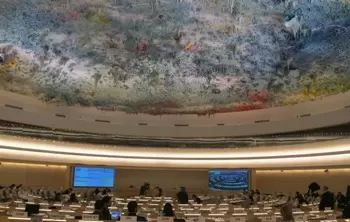More countries are now breathing down Sri Lanka’s neck and it is a good sign

07-December-2012
Vol 3 | Issue 49
The Universal Periodic Review (UPR) is a process in the United Nations Human Rights Council (UNHRC) in which member countries need to review their human rights records periodically once in four years. The review would be conducted by a Troika of 3 countries.
Sri Lanka’s case first came up under UPR in 2008, and the second review was conducted last month. India, Benin and Spain reviewed the performance of Sri Lanka over the past four years, during which period the carnage of Mullivaikkal took place in May 2009.
 |
|
At last month's UPR, 99 countires had made an overwhelming 210 concrete recommendations to Sri Lanka
|
However, the UPR did not get sufficient attention in the media and Sri Lanka managed to get away unnoticed with the intense scrutiny it was subjected to by the international community, which is slowly tightening the noose around Colombo.
The leakage of the Charles Petrie report commissioned by the UN to review the failure of the UN in protecting the civilians took the centre stage and overshadowed the coverage of the UPR.
During its first review in 2008 Sri Lanka in all got 95 recommendations from 39 countries. It accepted 52 recommendations and rejected 25 others, with no clear position on 8.
The very next year Sri Lanka set out on a path to destroy the Tamils, ending its military campaign with the Mullivaikal carnage in May 2009, where thousands of innocent Tamil civilians were massacred.
The then mute International community has now woken up to the cruel treatment of the Tamils in the ‘war without witness’ after a series of exposes of the Sri Lankan regime’s war crimes and human rights violations in the International media. It is reflected in the participation of 99 countries in the UPR of Sri Lanka. 29 NGOs and INGOs made their submissions along with 17 joint submissions by individuals.
An overwhelming 210 concrete recommendations were made by these 99 countries. Sri Lanka accepted 110 of those recommendations and rejected 100 others – which is nearly half of the recommendations made. In the history of UPR No member state has rejected these many recommendations.
In all Sri Lanka rejected the recommendations of 45 countries. Some of the most concrete suggestions which were aimed at bringing about the elusive reconciliation between the country’s different ethnic groups that Sri Lanka rejected were:
• Accede to the Rome Statute of the International Criminal Court (ICC) and draft a law on cooperation between the State and the Court
• Accede to the Optional Protocol to the Convention against Torture and Other Cruel, Inhuman or Degrading Treatment or Punishment
• Sign the International Convention for the Protection of All Persons from Enforced Disappearance
• Fully incorporate the Convention on the Elimination of Discrimination against Women into its domestic system
• Abolish definitely death penalty
• Adopt the draft bill on witness and victim protection
• Adopt legislation on appointments that would ensure the independence of the Human Rights Commission
• Fully implement the recommendations of the LLRC, in particular steps to ensure independent and effective investigations into all allegations of serious human rights violations, in the context of Sri Lanka’s civil war and its aftermath
• The US recommendations for detaching the military from civilian functions, creation of mechanisms to address cases of the missing and detained, issuance of death certificates, land reform; devolution of power; and disarming paramilitaries
• To expedite implementation of reconciliation measures in the North, which would include removing oversight of humanitarian and NGO activities from the purview of Ministry of Defense, reducing the intrusiveness of military presence on civilian life in the North and setting a specific date for free and fair Northern Provincial Council elections
• Adopt a national policy to provide human rights defenders with protection and ensure investigation and punishment of threats or attacks against them
• Fully cooperate with United Nations Human Rights mechanisms. Create a reliable investigation commission consisting of professional and independent investigators to identify, arrest and prosecute the perpetrators of the Muttur murders
• Publish the names and places of detention of all the imprisoned persons
• Take action to reduce and eliminate all cases of abuse, torture or mistreatment by police and security forces
• End impunity for human rights violations and fulfill legal obligations regarding accountability
• Strengthen judicial independence by ending government interference with the judicial process, protecting members of the judiciary from attacks and restoring a fair, independent and transparent mechanism
• Grant due process rights to all detainees held in both military and police facilities, including those held in administrative detention; disclose all unofficial detention sites; and facilitate effective and independent monitoring of detainees
• Allow the International Committee of the Red Cross unrestrictive access to detention centres
• Undertake measures that would allow citizens to have access to public information, in particular on alleged violations of human rights
• Ensure that all human rights defenders, including individuals cooperating with UN HR mechanisms, are protected effectively from unjustified criminalization, harassment or intimidation and can perform freely their legitimate duties.
These recommendations if accepted would have helped Sri Lanka in addressing issues of War crimes, Crimes against humanity and Genocide.
 |
|
The Eelam dream has not perished at Mullivakkal
|
Sri Lanka is a tiny island, why should more than half the member nations of the UN make these recommendations?
The participation of so many countries clearly shows that Sri Lanka is on the wrong path. Already a resolution against Sri Lanka was passed in March 2012 to mend its ways in treating the Tamils.
The UPR process is to help countries to correct their past mistakes and morally accept responsibilities. It is also to usher in a new beginning through democratic processes and plan a better future.
Sri Lanka by rejecting these concrete suggestions has once again proved that it is not ready to listen to the sane advice given by other UN member nations and is determined to walk on the path of self-destruction.
For the Tamils, the increasing attention of the international community on Sri Lanka can only mean that a just solution to their decades’ old grievance is round the corner!
(The author holds a Doctorate of Philosophy on ‘Internal Displacement and Human Rights situation in Northern Sri Lanka from Bangalore University. He was one of the four public speakers at the Permanent People’s Tribunal on War Crimes against Sri Lanka.)














